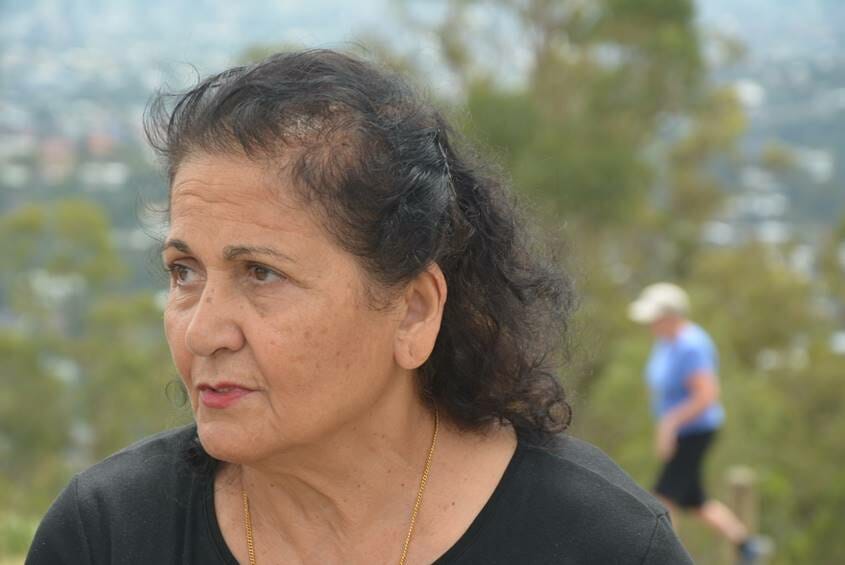
This is the 8th post about my mom’s journey from sickness to health. I hope that reading it will inspire you to explore different healing options. As we discovered, there are effective ways out there. We just need a change of mind and heart to explore them.
My mom was a very hard-working woman all her life. She started working when she was 12 years old. Since she was the oldest sister in a family where girls and women were “service providers”, she was convinced that it was her job to cook, clean and serve the men in her family.
She couldn’t afford to take time off or do things for fun. Everything she did was work. She either worked at home or worked somewhere else to bring money home. There were 9 people in her family. In our family, there we were 7. So, there was never an end to the work.
The only breaks she could ever get were when she was sick!
I remember that this was the rule for my siblings and me too. We could never stay home and miss school unless we were sick. I found out at a very early stage that being sick was the only way to get any discounts.
If I was sick, I didn’t have to do the dishes or clean. When I was sick, my dad would tell my siblings off when they had a fight with me. I was so sick when I was young that being sick was my identity.
In some families, being sick is a way to manipulate the adults into giving you what you want. It could never work if your family was not sensitive to being sick, but in the culture my mom came from, this was a very sensitive issue.
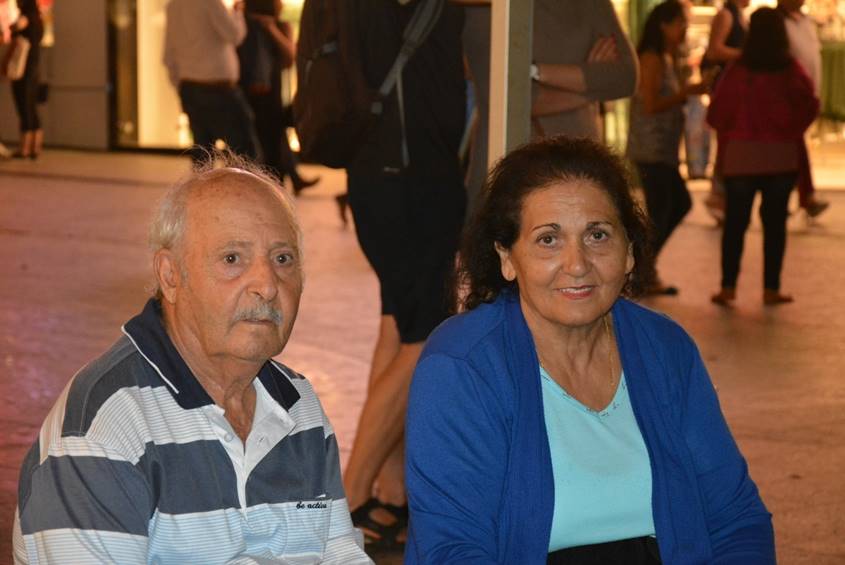
For years, my mother was a healthy person. I was the sick one in the family, which caused my parents a lot of fear and many visits to the doctors. I had a variety of health issues and when one finished, another problem started.
When I was 14, our family moved to another town after my uncles asked my parents to run a supermarket for them. That didn’t work very well. My mom started working as a cook at a local hospital, but that didn’t work very well either.
This is when my mom started with her health issues. Her legs became swollen and she had to rest a lot every day after work. It is very common that when people have emotional challenges, their immune system gets weaker and they become sick.
Sickness as a coping mechanism
In special education, we say that there are many “secondary benefits” to being sick. There is a lot of attention and a sense of control. You force people to treat you with pity and ease their demands from you. Sick people get many discounts.
The problem with this secondary benefit is that it creates a pattern. If I can’t cope, I get sick! Being sick turns into a coping mechanism.
So, what’s the problem with that?
Well, the problem with using sickness as a coping mechanism is that it only provides temporary relief. Then, we start feeling sorry for ourselves. We feel more and more miserable, while others gradually stop believing that we are sick. So, we need to increase the level of illness to benefit from the discounts of pity.
And this is exactly what my mom went through. She could not make people around her do what she wanted, so she used the health-related Miserable Card – she turned to sickness for help and had to constantly increase the severity of it.
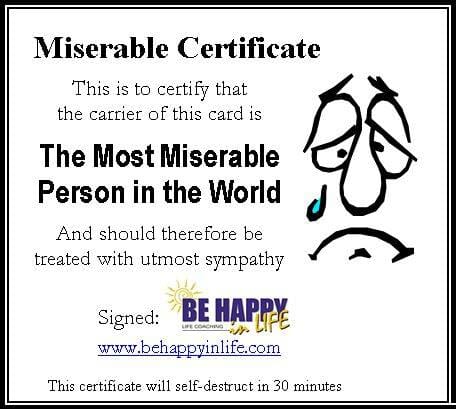
Miserable Card strategies
There are many ways to pull the Miserable Card. Not all of them are health related. However, all of them are versions of being a victim – everyone hates me, no one cares about me, no one understands me, I never had these opportunities, I’m not worthy, I don’t have what it takes, no one ever tells me anything, no one wants to be with me, I have no luck, I have no chance, no one ever told me, no one ever taught me…
Miserable people take no responsibility for their life. They always blame others or circumstances for their challenges in life. By doing that, they increase their feeling of inadequacy and lack of control.
My dad reads, tries new things and believes in the power of the mind. Every time he suggested doing something fun, she told him how much pain she was in. Even during their visit, whenever he suggested her to try eating something new, she said, “You don’t understand. I’m in pain”.
I only watched this for two weeks and wanted every time to ask, “What is the connection?” or “Mom, how about you give it a go? Maybe it will make the pain go away”, but she was so angry with him for offering that it was better not to take sides.
My dad was the drug dealer, but he was a lousy drug dealer, because his client could manipulate him with misery every second of the day. So, I taught him to use two techniques that work very well in such situations.
- I understand!
- Is there anything I can do to help you?
People bathing in self-pity want to be heard. If you offer them solutions, you do not understand them, because you cannot contain their self-pity and you’re trying to get rid of it. The expression “I understand” allows the listener to contain the feeling and be there with the sufferer for as long as needed, until the pain goes away.
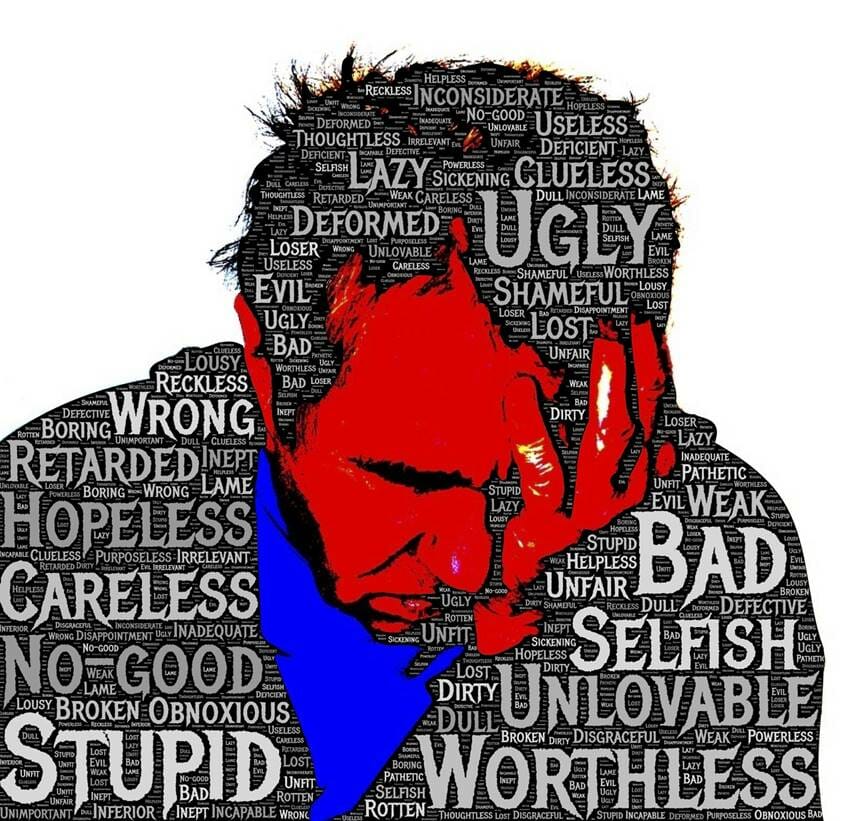
Miserable people tend to throw their feelings on others around them. They usually throw their feelings on those who stay, because it is exhausting to listen to misery and those who don’t have to stick around, leave.
When the listener asks, “Is there anything I can do to help you?” he/she acknowledges the pain, but takes no responsibility for it. This question sends the responsibility for finding a solution back to the sufferer. Sometimes, just the offer to help does the trick.
So, my dad practiced saying these things and they worked. We did the same and within 2-3 days, my mom stopped saying how sick she was or much she hurt.
During their visit, we spent hours at the sauna. This gave me a chance to share with my parents my personal stories of taking control over my own health and some of my client’s success stories.
At dinner time, when someone didn’t feel well, my mom was in panic. For her, being sick was the end of the world and she suggested we go to the doctor straight away. Our children were very casual about feeling unwell. We always told the kids, “If you need time off, take time off. Don’t be sick to force yourself to take a time off”.
Here in Australia, being sick is an epidemic. In every workplace, there are so many people calling in sick (“pulling a sickie”) that it has a big impact on the economy. People who are tired and work too much, call in sick because that’s the only way they think will get them the day off. The problem is that they end up really sick and feel bad. I would rather have fun on my day off than stay in bed.
When the kids talked about feeling unwell, they said things like, “I have no time to be sick. There are so many wonderful things I want to do. So, I’ll drink plenty of water, take vitamin C, sleep and mediate and everything will be OK”. I think the underlying message was “Grandma, you have nothing interesting to do, and that’s why you are sick”.
Misery and boredom
When people have interesting things to do, they have no time to think about their problems. Some healing philosophies say that sick people and people going through trauma or loss need to help others, so that they are stop thinking too much about their own pain.
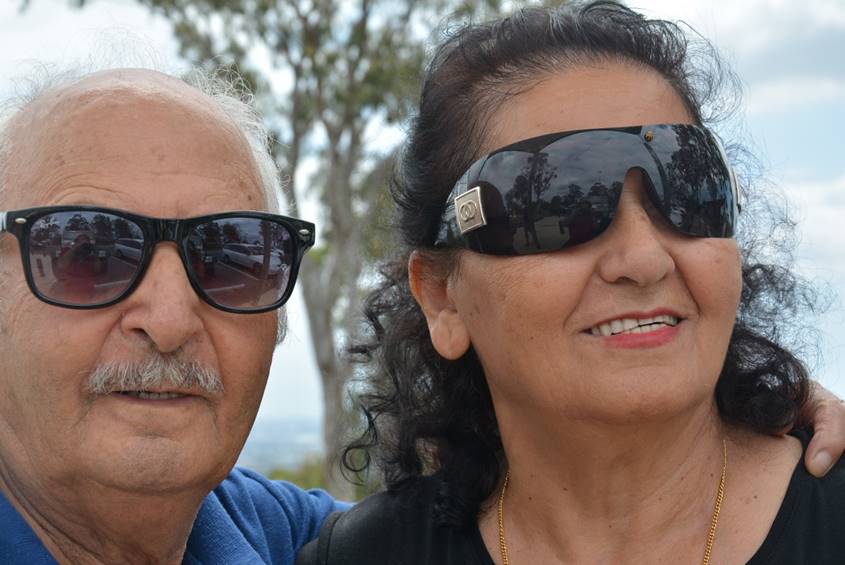
I tried connecting my mom to some of things she used to do in the past (not many!). 30 years ago, for about 2-3 years, she made jewellery from polymer clay. The second I reminded her that she was creative and she could do it again, she shared with me (for the hundredth time) the story of one doctor who bought her clay earrings and never paid for them.
She was so angry and so upset about it, it backfired. For her, doing polymer clay art triggered the feeling that she was a sucker.
I then tried to suggest volunteering as a way to kill boredom. My dad volunteers in 3 different organisations and is very happy about it. If you ask me, this is one the things that keep him healthy and his mind sharp.
When I suggested volunteering to my mother, she said there was nothing she knew how to do except cook. I told her, “Go cook for those in need”, and she said, “I cooked all my life for peanuts and now you want me to do it for free?”.
My mom did not understand the idea of volunteering. To her, helping others meant being a sucker. My daughters and I have an Etsy shop (we make custom paper flower arrangements for weddings), so we invited her to make some flowers with us, but she even refused to do that.
We lost the battle on this one!
But wait, there’s more. Next week, I will share with you how we used the placebo effect to cure my mom.
See you soon,
Ronit
This post is part of the series From Sickness to Health:
- From Sickness to Health: The Story of Our Life
- From Sickness to Health: Working Together on a Shared Goal
- From Sickness to Health: Doctors are Not Gods
- From Sickness to Health: Doubt Before Healing
- From Sickness to Health: The Pharmacist
- From Sickness to Health: John the Wizard
- From Sickness to Health: New Diet and The Drug Dealer
- From Sickness to Health: Miserable Discount
- From Sickness to Health: The Placebo Effect
- From Sickness to Health: Baby Ayla
- From Sickness to Health: Happy Ending











